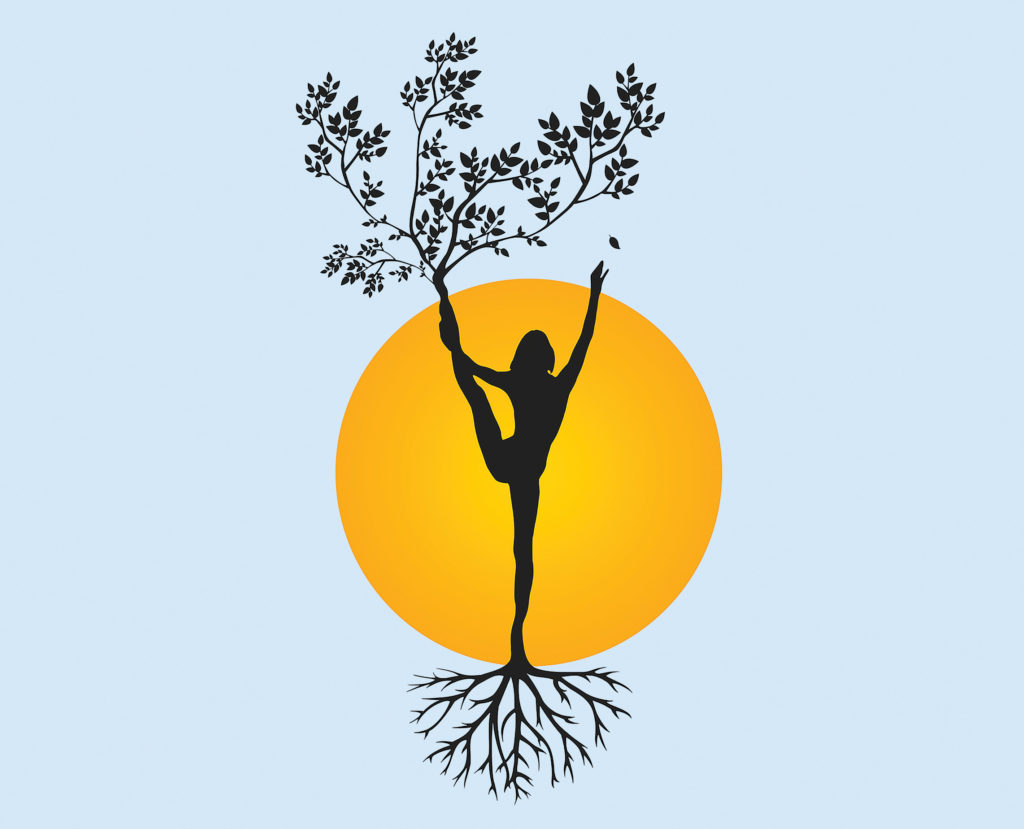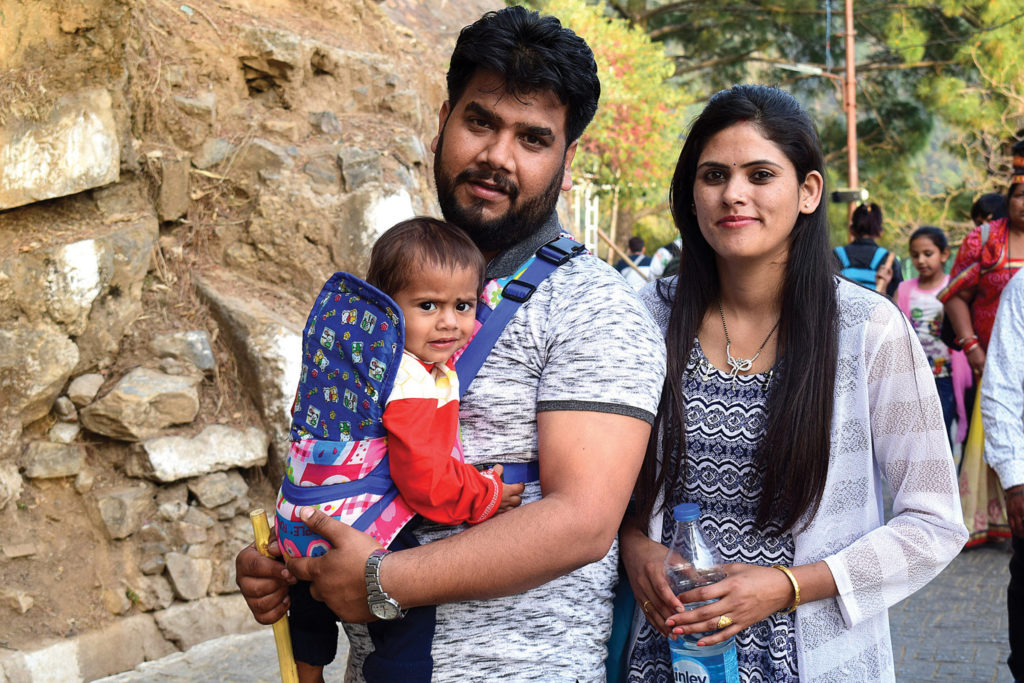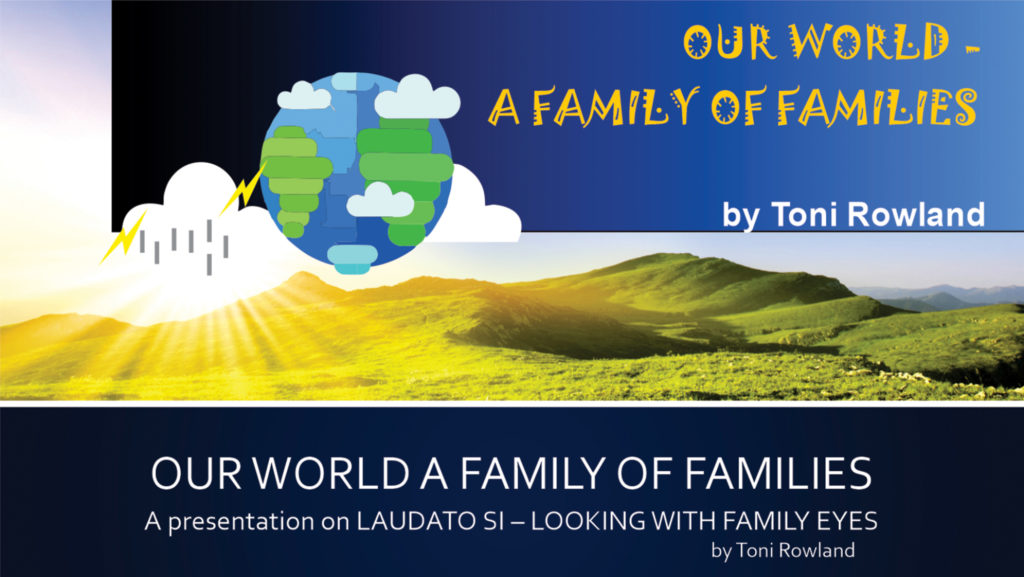SPECIAL REPORT • WOMAN-FAMILY-CREATION

The World, a Family of Families
Creation is made up of families and includes flora and fauna.
Women as life-bearers and life-carers, in so many ways the backbone of family life,
can promote many activities for ecological conversion and increasing environmental awareness
BY Toni Rowland | M.Phil. Christian Spirituality, Johannesburg Co-ordinator of MARFAM: Marriage and Family Life Renewal Ministry
MARFAM (MARRIAGE and Family) came into existence in 1994 as a result of a conference organised in Johannesburg by my late husband Chris, Fr Brendan Proctor and myself. We, Toni and Chris, had been involved previously in various marriage movements since 1979, but we realised that the reality of family life was more than only marriage. We dreamt of an evangelisation initiative, a broader family ministry than what was then offered by the family movements.
One of the objectives of the organisation was to produce publications such as magazines, liturgical reflection booklets, calendars and, from 1999, a website and e-newsletter, in order to support the various family ministries.
From 2003 to 2015, I was employed by the Southern African Catholic Bishops Conference (SACBC), with the commitment of establishing and running the Diocesan Family Life Desk.
In 2021 MARFAM chose as a theme, Our world, a family of families and its September theme Our world of Creation, links the celebration of the ecumenical Season of Creation (1 Sept.–4 Oct.) with its 2021 theme, A home for all? Renewing the Oikos of God.
Amoris Laetitia and Laudato Si’
Family life and climate change are current universal concerns. Pope Francis has written extensively on both. Amoris Laetitia (AL), The Joy of Love, was his 2016 Apostolic Exhortation on the Family and was promoted extensively during this Amoris Laetitia Year leading to the 2022 World Meeting of Families. In 2015 the Laudato Si’, On care for our common home (LS), his ecological encyclical, has also been widely promoted by the Laudato Si’ Action Platform and its 7-year plan. Both documents accept the societal need for “families,” ideally built on marriage as a lifelong, permanent commitment of a man and a woman bearing children.
Often in his writings Pope Francis addresses all people and families from everywhere, Christian and those of other religions. In his highlight of the World as our common home, a family of families, he also includes flora and fauna.

August: on human sexuality
In August MARFAM focuses on the theme: Sexuality, a family gift. God looked on creation and was pleased. Particularly good is the ability to develop and evolve through the reproductive capability of creatures. Special attributes of humans, including free will, make human sexuality a special gift and blessing. Most profoundly, in marriage, it has the potential to mirror the unity of God-love and creativity. Sexuality is still a taboo subject, not sufficiently promoted and too often abused. Different attitudes exist in the Church and society towards various sexual issues, in particular sexual orientation. “Sexuality is not a means of gratification or entertainment, it is an interpersonal language wherein the other is taken seriously in his or her sacred and inviolable dignity (AL 151).
In today’s society attitudes and practices around sex and sexuality have changed vastly from the ideals. Sex is no longer regarded as being for reproduction or even for couple love, as sex outside marriage is common even with very young people. Sexuality is part of the human make-up from the day of birth.
However, issues of gender identity and sexual orientation are changing the traditional understanding and acceptance of what constitutes male and female, their roles and behaviours within and beyond their families. In many ways, women are as liberal as men. Gender-based violence is a negative aspect of sexuality that has dominated the social discourse in our time. Equal dignity of men and women is almost universally accepted, in principle—a fact to be celebrated—but it is not yet a generally accepted practice.
Sexual reproduction in the evolutionary history of creation has captured my interest, and the evolution of the roles and relationships of male and female are incorporated into my current thinking. Unicellular organisms, able to reproduce themselves, were the first forms of life on earth and sexual differentiation and reproduction followed in due course. In plant, animal and human life, this has remained the way of sustaining forms of life for millions of years.
In Amoris Laetitia, Pope Francis strongly promotes marriage. It does acknowledge the variety of family situations, e.g. cohabitation, single parent, divorced and remarried, same sex, “that can offer a certain stability. Only the exclusive and indissoluble union between a man and a woman has a plenary role to play in society as a stable commitment that bears fruit in new life” (AL 52).
Women’s rights are addressed in AL 54. Significant advances have been made in various places but “unacceptable customs still need to be eliminated: domestic violence, and forms of enslavement which, rather than a show of masculine power, are craven acts of cowardice. The verbal, physical and sexual violence that women endure in some marriages contradicts the nature of the conjugal union.”
Criticised are genital mutilation, lack of equal access to dignified work and roles of decision-making, patriarchal cultures considering women inferior, as well as surrogate mothers and the exploitation and commercialization of the female body. Pope Francis claims that the argument by which many of today’s problems have arisen because of feminine emancipation is not valid: “Some forms of feminism may be considered inadequate, but we must nonetheless see in the women’s movement the working of the Spirit” (AL 54).

September: Our world of families
Laudato Si’, focusing on the care for our common home, also involves family, male and female and includes particular valuable references to relationships.
In the overall evolving world of nature, in the process of reproduction, male and female creatures, performing different tasks, necessarily required different characteristics and developed psychological characteristics associated with their roles. The male provides the sperm, the female carries and produces offspring and continues to be their primary caregiver. Frequently, the mother is supported by the father, whose main tasks however have been provider and protector.
While the male component has been dominant and the female subordinate, the traditional roles do not legitimise present-day inequality. An insightful research article into gender roles and gender inequality (Nan Zhu & Lei Chang 2019) explains how by virtue of their role, men became specialised in skilled activities that take them away from home, while women focus on domestic tasks. Men achieve higher status via the monopoly of warfare, agriculture and production activities which generate far more material wealth than domestic labour.
Not only labour but its associated power has largely determined existing gender relations.
As women are becoming released from the task of child-bearing and have become more involved in the labour market, their expectations and even their behaviours continue to change, while those of men have not kept pace. Traditional masculine and feminine traits are being challenged.
The debate on equity in the workplace is most often dealt with in isolation and separated from the context of family life in which both are still rooted. Addressing gender inequality can and should be seen in the context of healthy families rather than a ‘women versus men’ issue.
Societal attitudes towards loss of traditional faith and individualism are contributing factors to the conflictual situation.

Relationships
Are we sufficiently aware of how other elements in nature are also made up of families, fields of sunflowers, or of mealies, a natural forest, or how plants produce their seed to continue their existence in our world? Biodiversity and sustaining the species are necessary as one species sustains others.
Pope Francis writes, “Each year sees the disappearance of thousands of plant and animal species which we will never know, which our children will never see. Because of us, thousands of species will no longer give glory to God by their very existence, nor convey their message to us” (LS 32–34). This is the time when once again women as life-bearers and life-carers, in so many ways the backbone of family life, can promote many activities for ecological conversion and increasing environmental awareness.
Laudato Si’ develops in a very meaningful way the relationality of the Trinity. While presenting the roles of the three persons, essentially the Trinity is a community of persons in the most intimate love relationship. We, humans, as the sub-family of creation which has the potential to love in response, are called to imitate, emulate and love all elements of creation, not only to care for but to strive to love as the Creator does. The love of man and woman ideally in marriage is well described in Amoris Laetitia, but intimate familial love, e.g. mother-child love is at the heart of all family relationships.
All in all, I believe that more broadly too, families are the basic units of the Church—and the image for Africa is “Church as Family of God”. It is important that not only should families, and their members, appreciate and play their part in caring for creation but it should be understood that creation is made up of families. It is a question of identity. As God in the Trinity is family, and the particular creative relationships of our human families made up of men and women are at the heart of creation.“The human person grows more, matures more and is sanctified more to the extent that he or she enters into relationships, going out from themselves to live in communion with God, with others and with all creatures. In this way they make their own that trinitarian dynamism which God imprinted in them when they were created. Everything is interconnected and this invites us to develop a spirituality of that global solidarity which flows from the mystery of the Trinity” (LS 240).
